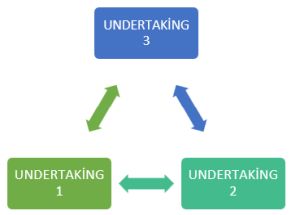1. What does Hub & Spoke mean?
It is a concept that took place in the business world before it took place in the Competition Law literature. Delta Airline has determined a focal point (hub) in order to prevent damage to the aircraft flying with the number of passengers far below the company's capacity and accordingly to this, Delta Airlines has developed the method of collecting passengers at this focal point. This method was later used in cargo operations which had a serious impact on costs.
2. What is Hub & Spoke under Competition Law?
There is no direct definition in Turkish legislation. However, Hub&Spoke can be briefly defined as the exchange of information between two rival undertakings operating at the same level in the market, through another undertaking at a different level in the market and with which they have vertical relations. In other words, it can be described as a different type of "information exchange" that violates competition law. In this method trategically competitive information exchange is done through a third enterprise without the actual competitors coming together.
Here, the undertaking that is at a different level from the undertakings that exchange information in the market and that has a vertical relationship is called as "hub". Other undertakings which are operating at the same level called as "spokes" (satellites). In competition law, Hub & Spoke can also be defined as the collection of information which violate competition law by undertakings that are competing with each other at the horizontal level, over the undertaking that is in the "Hub" position.
3. In which type of markets is Hub & Spoke mostly seen?
When the decisions made in the USA and Europe are examined, it is observed that information exchanges of this nature occur in markets whose structure has changed due to concentrations. With the realization of concentrations, the number of undertakings operating in the current market is decreasing. In this case, undertakings make an effort to continue their activities in the market by making use of various information exchanges. It is desired to avoid material damages by exchanging information through retailers that have become very powerful in the market.
4. What is the aim of Hub&Spoke?
Although there is no obligation in terms of the nature of the violation within the scope of Hub&Spoke, it is seen that the purpose of the decisions in this context is to determine the resale price. In other words, the undertaking at the other level of the market transfers the information obtained from an undertaking at the same level to the other undertaking, in order to determine the resale price or to have an impact on this issue. This, in turn, affects the competition on price by undertakings competing at the same level of the market.
5. What distinguishes Hub&Spoke from other competition law violations?
The reason why Hub&Spoke is defined as a new type of violation, unlike other types of violations within the scope of competition law, is that it basically combines the characteristics of both horizontal violations and vertical violations. Here, the exchange of information is done indirectly, not directly. There is no direct exchange of information between undertakings, or it is negligible compared to indirect exchange of information. In other words, it does not have a decisive character in terms of violation.
6. How does the Hub&Spoke information exchange process work?
First of all, we assume Undertaking 1 and Undertaking 2 as two undertakings at the same level of the market and Undertaking 3 as an undertaking which operates at a different level of the market. (The undertaking 3 may be a supplier or a vendor.)
Undertaking 1 provides Undertaking 3 with information that would be considered sensitive in terms of competition law. However, it is known and requested by Undertaking 1 that this information will go to rival Undertaking 2. In other words, Undertaking 1 aims to give this information to Undertaking 3, for it to intervene in the market. Undertaking 3 transmits the information to Undertaking 2 which are transmitted by Enterprise 1.

In order to mention that there is an indirect exchange of information that violates competition law and to hold Enterprise 2 responsible for it, Undertaking 2 must also be aware (or at least to be able to know) that this information transmitted from Undertaking 1. In other words, Enterprise 2 must also be doing this with a motive that violates the competition law while exchanging information with Enterprise 3.
7. How do the horizontal and vertical violations mentioned in Hub&Spoke occur?
Although there seem to be two separate deals in the Hub & Spoke process, there is only one deal involving at least three undertakings. In this context, a vertical violation occurs when Undertaking 3 transmits the information it receives from Undertaking 1 to Undertaking 2. In other words, it occurs when it intervenes in the market in violation of competition law. The horizontal element of the violation occurs when Undertaking 1 and Undertaking 2, which are operating at the same level of the market, exchange information, but as mentioned at the beginning, this information exchange should be done through Enterprise 3, not directly.
8. How does the Competition Board (Board) define the concept of Hub & Spoke in its decisions?
The pre-investigation decision of the Tire Manufacturers and Importers Association (LSID) numbered 15-44/731-266, given by the Competition Board, is the decision that defines the information exchange in question. In the said decision, it is claimed that more than one company that sells in the tire industry shares tire sales figures and price increases with joint dealers.1 In the relevant decision, it is also mentioned that there are anti-competitive provisions in the agreements of authorized dealership and anti-competitive activities are carried out by the Tire Manufacturers and Importers Association.2 In the said decision, the Competition Board refers to the "Tesco" decision given by the Competition Appeal Tribunal and resolves the issue based on the criteria set out in the Tesco decision. These criteria are explained as follows:
- Provider A transmits future pricing information to partner retailer X with the intention of influencing competitor provider B's market behavior,
- Retailer X transfers this pricing information to B,
- B also determines its own pricing policy by using this information that it believes belongs to rival firm A. (which he firmly believes)3
As a result of the examinations, the Competition Board decided that the exchange of information was not in violation of competition. The Board based its decision on the grounds that the information sharing was made with the motive of price bargaining, therefore the condition specified in article A, above-mentioned, was not fulfilled.
Another important decision made by the Competition Board on the subject is the ARAL decision.4 The relevant decision is about Aral Oyun Konsol ve Aksesuar Tic. A.Ş. which is importer/ distributor and the technology markets Teknosa, Kliksa, Bimeks, Vatan, D&R and Gold, which are the retailers of this company "within the scope of computer and console games market". Competition Board in Aral decision referred to the "Replica Kit" decision, not the "Tesco" decision.
As stated in the section on the LSID decision, 3 conditions were put forward in this decision of the Board. Competition Board did not decide whether there was an infringement on Bimeks Company "in terms of game console market" and Bimeks and Vatan companies in terms of "consumer electronics market". However, when the Competition Board was examined according to 3 violation conditions, it concluded that they violated Article 4 of the Law No. 4054 on the Protection of Competition through vertical price fixing agreements, and gave a violation decision about the remaining companies.
In addition, within the scope of the investigation carried out by the Competition Board about the chain markets dealing with the retail trade of food and cleaning products, and the undertakings at the producer-wholesale level, which are their suppliers, and one Association, dated 28.10.2021, numbered 21-53/747-3605 should be considered. In this context, it is concluded that the coordination of prices and price transitions is ensured through direct contact or indirect contact through joint suppliers between A101, BİM, CarrefourSA, Migros Ticaret and ŞOK. In addition, it is concluded that competitively sensitive information such as future prices, price transition dates, seasonal activities and campaigns are shared directly or through partner suppliers. In this context it is understood that, by intervening in the prices of undertakings that have reduced prices or that have not yet increased prices in the period when the prices in the market have increased, the said prices have been increased to the detriment of consumers; In case the competitor's prices do not increase, compliance with the collusion between the undertakings is constantly observed through price reductions and/or penalization strategies such as issuing a return invoice to the supplier, which are implemented rapidly for the specific product and/or region. Thus, by stating that the mentioned undertakings have the purpose of determining the retail sale prices of many products offered for sale and there are cartel-like agreements or concerted practices that also exhibit hub and spoke feature, violate Article 4 of the Law No 4054. Administrative fines were imposed on the undertakings concerned. This decision of the Board has been appealed by the relevant undertakings.
Footnotes
1. Rekabet Kurulu, 15-44/731-266 sayılı ve 16.12.2015 tarihli önaraştırma kararı
2. Rekabet Kurulu, 15-44/731-266 sayılı ve 16.12.2015 tarihli önaraştırma kararı
3. Rekabet Kurulu, 15-44/731-266 sayılı ve 16.12.2015 tarihli önaraştırma kararı
4. https://www.rekabet.gov.tr/Karar?kararId=2386aaf0-f39a-4ac0-9e6c-cb5a3fcf0789
5. https://www.rekabet.gov.tr/Dosya/geneldosya/zincirmarketler_nihaikararduyurusu-pdf
The content of this article is intended to provide a general guide to the subject matter. Specialist advice should be sought about your specific circumstances.

